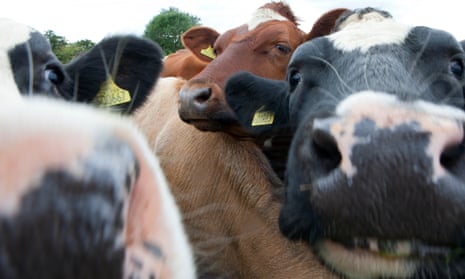High-carbon lifestyles are desperately unhealthy, according to Hugh Montgomery, director of the UCL Institute for human health and performance and co-chair of the Lancet commission.
Cutting red meat and dairy consumption would lead to a big saving in methane, which is 23 times as potent a greenhouse gas as carbon dioxide “from essentially belching cows. That saves a lot of strokes, heart disease, bowel cancer and so forth,” he said.
Big savings are possible from “active transport” – more cycling and walking. Reductions in vehicle particulates improves respiratory health and reduces cardiovascular disease, as well as making people healthier and happier.
There are very big savings from people using more calories to move around, reducing obesity, diabetes and cardiovascular risks. The European commission says savings of well over €30-35bn (£22-£25bn) per year in healthcare costs could be made from quite modest reductions in greenhouse gases.
Many cities in North America and Europe have started to go green. “All the surveys show that 80% of people want this. Let’s accelerate that. Let politicians catch up with the appetite of their citizens and mayors,” said Anthony Costello, director of the UCL Institute for global health and co-chair of the commission.
He cited Melbourne which has set itself to become zero carbon, San Francisco, Chicago, Seattle, Minneapolis, Zermatt and Vancouver. “Bogota has set itself very aggressive targets for becoming low emission and investing hugely in buses and electric transport,” he said.
In the UK, Newcastle, Leicester, Brighton, Bristol, Edinburgh and even London, which has introduced a lot more cycle pathways, are moving in the same direction. It’s not just about cycling, but also green infrastructure for flood mitigation and fresh water control, and having more parks for recreation with direct benefits on people’s health. There are also indirect benefits – trees buffer, wind and noise.
The cost of air travel might have to rise, but one proposal is that one cheap family package holiday per year would be allowed.
“The growth in air transport is short hop, short term leisure travel,” said Paul Ekin, professor of resources and environmental policy at UCL. “Stag parties in Barcelona over the weekend – that sort of thing might become quite a bit more expensive so people might think twice about doing that. But at the kind of carbon prices we’re looking at – $200 per ton perhaps by 2050 – that would not translate even to a doubling of current airfares. One mustn’t exaggerate, but it would become more expensive.”

Comments (…)
Sign in or create your Guardian account to join the discussion